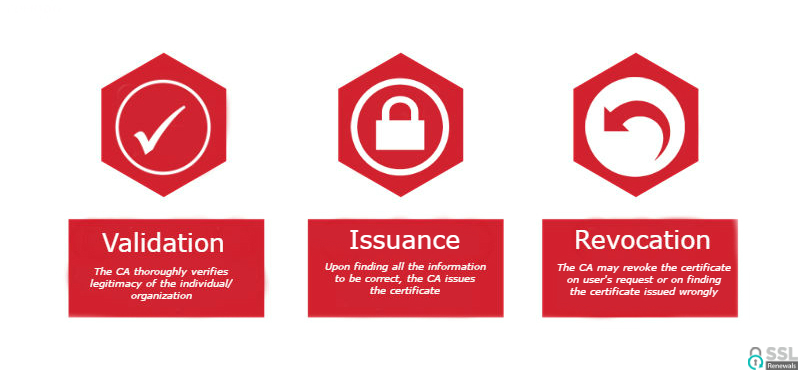It’s important to understand the role of certificate authorities before making a choice
A Digital Certificate is an excellent way to secure the connection between a web browser and a web server. As a result, there has been a significant rise in the adoption of digital certificates, especially SSL certificates. For online businesses, having an SSL certificate installed has become an absolute must in today’s age.
“HTTPS” connection has played a vital role in the skyrocketing e-commerce industry. SSL certificates use public key infrastructure (PKI) to ensure a private connection between the client and the server. The certificate is authenticated by the user via asymmetric encryption with a public key and private key. The Certificate Authority (CA) that issues the certificate and private key play a significant role here.
In layman’s terms, a certificate authority is an entity responsible for issuing digital certificates. A certificate authority scrupulously validates the legitimacy of the organization or the individual before issuing the certificate. This is perhaps, the most important part that a certificate authority plays. Upon finding all the information to be correct and falling within the guidelines set up by the CA/B forum, the CA issues the website a certificate. The web browser recognizes the authenticity of the website and gives the “HTTPS” or secure connection sign to the web visitors. With HTTPS configured properly, the website displays several visual indicators such as an address bar with business name, site seal, padlock, etc.

Role of a Certificate Authority (CA)
As you know, a certificate authority acts as the originator of the SSL certificates. But, the role of the certificate authority is not just limited to that. In fact, the responsibilities of CA start long before the issuance process.
A Certificate Authority is supposed to conduct a thorough validation of the organization requesting the certificate. The authentication process entirely depends on the type of SSL certificate you want to purchase.
As far as the Domain Validation (DV) SSL certificates are concerned, the CA only verifies the domain ownership of the applicant and issues the certificate. In the case of Organization Validation (OV) and Extended Validation (EV), the certificate authority will verify the business registration documents and credit reports. This vetting process is designed to be a very rigorous process which takes around 3-5 working days.
The vetting procedure is said to be the most important part from a cybersecurity point of view. The CA must make sure that SSL certificates are issued to the legitimate entities only. Therefore, the certificate authorities must enforce a stringent and precise authentication process so that any mischievous group doesn’t get hold of one.
Always Prefer Trusted Certificate Authorities
There have been instances of SSL certificates being issued to spoof domains in the past. The fraudsters identify the weak link in the issuance process of the certificate authority and use the phishing technique to fool website visitors. From an online user’s point of view, it is virtually impossible to know it as the fraud websites consist of a padlock, something that online users are told to look for religiously before making any transaction on the internet. Hence, it is unquestionably essential to install the SSL certificates provided by a trusted certificate authority.
The most trusted certificate authorities issue the SSL certificates by rigorously following the guidelines given by the CA/B forum, thus recognized by all leading web browsers. Leading tech giants such as Apple, Mozilla, and Google banned a Chinese certificate authority for issuing certificates deceptively. As a result, all the leading browsers stopped recognizing the certificates of that CA. You don’t want that to happen, do you?
The certificates provided by reliable certificate authorities are entrusted by millions of users worldwide. For this reason, the infrastructure used to protect the cryptographic keys of these users must be heavily armed to avoid any PKI failure. Even in the case of such failure, you get the peace of mind being backed by an enormous amount of warranty.
Things to consider while choosing a certificate authority
Selecting the right certificate authority for your websites is crucial, yet it often goes under the radar. Often the website owners look for the cheapest available certificate. But cyber-attacks on a business website don’t go unnoticed by online users. It can leave a huge dent on your reputation consequently plunging your revenues. Here are the factors that you should acknowledge before making a choice.
- Security measures are taken by the CA to protect cryptographic keys
- Rigor employed in the validation process
- The popularity of the CA
- Recent history & reputation
Protect your website with a reliable certificate authority
Demonstrate the authenticity of your website with some of the globally trusted SSL providers and save up to 72%
Final Word
Ultimately, both the parties have no option but to rely on a certificate authority. But, it is up to us to choose the right certificate authority, right? Given the fact many things are at stake here, we strongly endorse incorporating the aforementioned suggestions in order to protect your website/app with a trustworthy certificate authority.








 (8 votes, average: 4.00 out of 5, rated)
(8 votes, average: 4.00 out of 5, rated)